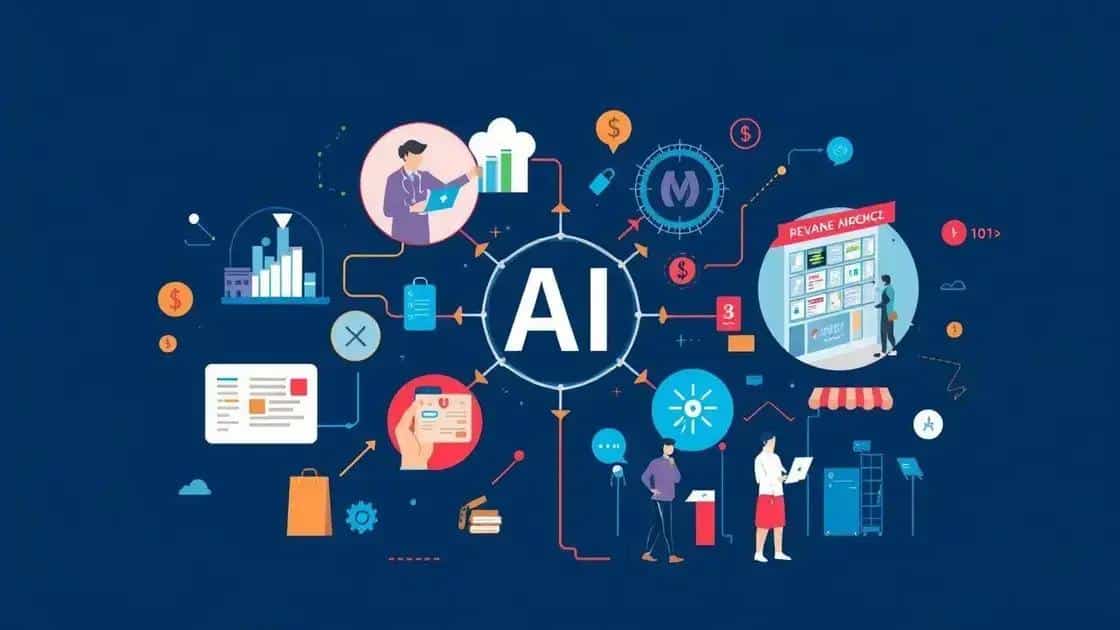Insights on ai innovation trends transforming industries

AI innovation trends are transforming industries through enhanced automation, personalization, ethical considerations, and increased integration, shaping a future where AI profoundly impacts everyday life and business operations.
Insights on ai innovation trends are reshaping how businesses operate. Have you noticed how AI is increasingly involved in everyday technology? This article will dive into the trends driving AI innovation today.
current ai innovation trends
Before diving into current AI innovation trends, it’s important to understand the landscape of artificial intelligence today. This technology is evolving rapidly, impacting various industries. Let’s explore some key trends that are shaping the future of AI.
Major Trends in AI Innovation
The world is observing several noteworthy trends in AI innovation:
- Automated Machine Learning: Businesses are increasingly opting for automated solutions to streamline AI model development and deployment.
- Natural Language Processing (NLP): AI tools capable of understanding and generating human language are disrupting sectors like customer service and content creation.
- AI Ethics and Bias Mitigation: As AI’s role grows, addressing ethical concerns and biases in algorithms has become crucial for public trust.
- Explainable AI (XAI): Companies are seeking ways to make AI decisions clearer to users, fostering transparency.
These trends highlight the dynamic nature of AI and its pervasive influence. The rise of cloud-based AI is enabling businesses to leverage AI technologies without substantial infrastructure investments. Additionally, the integration of AI with Internet of Things (IoT) devices is creating smarter, interconnected systems that enhance efficiency across various applications.
AI in Industry
Industries are not just adopting AI but are also changing operational models. For example, in healthcare, AI is revolutionizing patient care through predictive analysis and personalized medicine. In finance, algorithms are enhancing fraud detection and risk assessment significantly. As companies embrace these innovations, the focus should be on building a robust infrastructure that supports AI processes and promotes data security.
Furthermore, developing a well-rounded team that combines data scientists, IT professionals, and AI specialists is vital to fully harness AI’s potential. Continuous training will ensure that the workforce stays updated on emerging trends and technologies.
impact of ai on various sectors

The impact of AI on various sectors is profound and multifaceted. As artificial intelligence continues to develop, its presence is felt across numerous industries, transforming how businesses operate.
Healthcare Transformation
In healthcare, AI technologies are enhancing patient care through initiatives like telemedicine and predictive analytics. These innovations help clinicians make better decisions and improve patient outcomes.
- Predictive Analytics: AI analyzes data to forecast patient risks and outcomes.
- Personalized Medicine: Treatment plans are tailored based on individual patient data.
- Administrative Efficiency: AI automates scheduling, billing, and record management, allowing staff to focus on care.
These benefits lead to improved efficiency and lower costs for healthcare providers while enhancing patient satisfaction.
AI in Finance
The finance sector is leveraging AI for improved accuracy and efficiency. Risk assessment is more precise, and fraud detection systems are more effective than ever.
AI technologies analyze vast amounts of data quickly, identifying patterns that may indicate fraud. This means that banks and financial institutions can respond swiftly to potential threats. Moreover, customer service has seen a boost through the use of chatbots that handle inquiries effectively and efficiently.
Retail and Customer Experience
In retail, AI personalizes shopping experiences, tailoring recommendations to consumer behavior. From virtual assistants to smart inventory management, AI is reshaping how retailers engage with their customers.
- Personalized Marketing: AI algorithms predict what products customers are likely to want.
- Inventory Optimization: Automated systems ensure that products are in stock based on demand predictions.
- Customer Insights: Businesses gain valuable insights into customer preferences and behaviors through AI analytics.
These technologies not only enhance sales but also build stronger customer relationships.
The impact of AI is also visible in industries like manufacturing, where automation improves efficiency, and in education, where personalized learning is emerging. As AI continues to evolve, it will further influence these sectors, driving innovation and change.
challenges faced in ai implementation
The challenges faced in AI implementation are significant and can hinder the potential benefits of this transformative technology. Many businesses encounter various obstacles when integrating AI into their operations.
Data Quality and Availability
One primary challenge is the quality and availability of data. AI systems rely heavily on data to function effectively. Poor quality data can lead to inaccurate results, and incomplete datasets may cause AI models to perform inadequately.
- Inaccurate Data: If the data used to train AI models is flawed, the outcomes will likely be flawed as well.
- Insufficient Data: A lack of comprehensive data can impede the AI’s ability to learn and adapt.
- Data Privacy Concerns: Collecting data raises privacy issues, which can lead to regulatory complications.
As businesses navigate these complexities, ensuring that they have access to high-quality data becomes crucial.
Integration with Existing Systems
Another major hurdle is integrating AI with existing systems. Many organizations have legacy systems that are not designed to work with new AI technologies. This creates compatibility issues that can slow down the implementation process.
Moreover, organizations often need to train their employees on how to use these new systems effectively. Resistance to change among staff can also be a barrier. Not everyone is eager to adopt AI tools, fearing job displacement or feeling overwhelmed by new technology.
Cost and Resource Allocation
Cost is also a critical factor. Implementing AI solutions can require significant investment, not just in software but also in training staff and maintaining the systems.
- High Initial Costs: The upfront expenses can be daunting for smaller businesses, which may delay adoption.
- Ongoing Maintenance Costs: Beyond initial investment, there are ongoing costs for updates and maintenance.
- Skill Shortages: There’s a growing demand for skilled professionals who can develop and maintain AI systems.
Addressing these challenges is vital for organizations to unlock the full potential of AI. A strategic approach that includes thorough planning, investment in training, and ensuring data quality can make the transition smoother.
future predictions for ai technology

The future predictions for AI technology indicate a landscape where AI becomes even more integrated into our daily lives. As advancements continue, we can expect these technologies to evolve rapidly, impacting various sectors.
Enhanced Automation
One prediction is the rise of enhanced automation across different industries. This means that AI will perform more tasks currently handled by humans, improving efficiency and reducing costs.
- Manufacturing: More robots will work alongside humans, streamlining production lines.
- Service Industry: Automated systems will manage customer service inquiries, allowing human agents to focus on complex issues.
- Logistics: AI-driven delivery systems and inventory management will reduce errors and speed up processes.
Automation will reshape job roles, requiring workers to adapt to new responsibilities.
AI Ethics and Regulation
With increased reliance on AI, discussions about ethics and regulation will intensify. Companies will need to address concerns like data privacy and algorithmic bias. Future technologies will incorporate ethical considerations to ensure fair usage.
Organizations will have to develop guidelines and best practices for responsible AI deployment. This shift will focus on creating transparency around how AI systems make decisions, fostering public trust.
Personalization and User Experience
Another trend will be a significant increase in personalization. AI will gather and analyze data more effectively, allowing businesses to tailor experiences to individual users.
- Content Creation: AI will help generate personalized content that aligns with user preferences.
- Retail Experiences: Shopping experiences will become more customized as AI predicts customer desires.
- Healthcare Solutions: Patients will receive treatments based on their specific health data, improving outcomes.
This level of personalization will enhance user satisfaction and engagement, driving loyalty and growth.
As we look ahead, it’s clear that AI technology will continue to expand its influence and capabilities. The journey of AI will be marked by challenges, but its potential to improve lives and industries is immense.
FAQ – Frequently Asked Questions about AI Technology
What are the key benefits of AI automation?
AI automation increases efficiency by handling repetitive tasks, allowing employees to focus on more strategic work.
How can AI improve customer personalization?
AI analyzes customer data to tailor experiences and recommendations, enhancing satisfaction and engagement.
What challenges might businesses face implementing AI?
Challenges include data quality issues, integration with existing systems, and the need for skilled personnel.
What is the future of AI technology?
The future includes enhanced automation, increased emphasis on ethics, and greater personalization in services.





